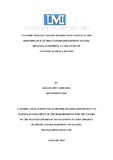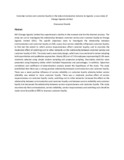Contribution of Customs Information System to the Performance of the Customs Department Uganda Revenue Authority: A Case Study of Customs Kampala Region

View/
Date
2012-01Author
NAMULESA, Lillian Joy
Prof. Basheka, Benon C.(Supervisor)
Sabiiti, Moses (Work-Based Supervisor)
Metadata
Show full item recordAbstract
The study examined the contribution of Customs Information System (CIS) as the independent variable to the performance of URA’s Customs Department as dependent variable. Performance measures were efficiency, control, and administrative burden and the moderating variable was capacity of users. To explain how CIS could help users perform and control tasks employed the Systems Theory, Resource-Based Theory and Task Technology Fit Theory. It also used a case study design using both quantitative and qualitative approaches. A population sample of 114 was selected using stratified and purposive sampling techniques. Quantitative data was analyzed using frequencies, percentages, mean, standard deviation and correlations established relationships while regression assessed the contribution of the CIS to performance in the Customs Department. Qualitative data analysis involved data reduction, data display, analysis and interpretation. Findings revealed a strong significant relationship between the CIS and efficiency (r = .658, p = .000); CIS and control (r = .711, p = .000); except administrative burden which was (r = -.104; p = .334) in performance of the Customs Department. The CIS accounted for 43.2% of variance in efficiency in performance and 50.5% of variance in control but did not significantly affect the administrative burden.
Some of the lessons learnt from the study are; the importance of IS/IT in supporting organizational performance by improving efficiency, giving due consideration to antecedent factors. With regard to control, nature of jobs and values, referred to as standards are explained. Furthermore, IS explains how administrative burden arising from tax regulations can be reduced, while the importance of fit between technology and capacity of users enable the achievement of intended goals. It was concluded that CIS significantly affected performance of the Customs Department. Therefore, URA should continue using CIS by improving data input, processing, output and user capacity to further improve efficiency, control and reduce the administrative burden in performance of the Customs Department.
Collections
Related items
Showing items related by title, author, creator and subject.
-
Customer service and customer loyalty in the telecommunication industry in Uganda: a case study of Orange Uganda Limited
Gwosanze, Dianah (Uganda Management Institute, 2012)M/S Orange Uganda Limited has experienced a decline in the renewal rate for the internet services. The study set out to investigate the relationship between customer service and customer loyalty at Orange Uganda Limited ... -
CUSTOMER SERVICE AND CUSTOMER LOYALTY IN THE TELECOMMUNICATION INDUSTRY IN UGANDA: A CASE STUDY OF ORANGE UGANDA LIMITED
GWOSANZE, DIANAH (Uganda Management Institute, 2011-12)M/S Orange Uganda Limited has experienced a decline in the renewal rate for the internet services. The study set out to investigate the relationship between customer service and customer loyalty at Orange Uganda Limited ... -
SERVICE QUALITY PERSPECTIVES AND CUSTOMER SATISFACTION IN BANK OF AFRICA (U) LIMITED
AYEBARE, DOREEN (Uganda Management Institute, 2013-12)The study assessed the relationship between service quality perspectives and customer satisfaction in Bank of Africa (U) Ltd. Despite all the interventions the bank put in place to serve customers better, many were still ...


